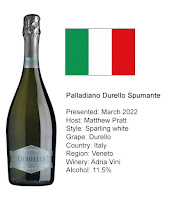The theme of the evening, given by the title above, gives more than a small hint about the nature of the wines presented to the Freeland Wine Club during our March meeting.
The evening was hosted by wine club member David Lloyd who introduced
Matthew Pratt, a wine expert from Moreton Wine Merchants in Moreton-in-Marsh.
Matt developed an interest in wine after volunteering to help with a wine tasting in a supermarket at which he was working while a student. He was able to sample some of the wine during the tasting and had one of those life changing moments. If wine could taste this good, he needed to know more about them. The rest, as they say, is history.
Matt’s interest and passion for the subject was obvious as
he took us on an exploration of the length and breadth of Italy, from Veneto in
the north to Sicily in the south. We were able to savour the oenological delights
the country has to offer as we joined him on the journey.
The wine offers citrus and gent floral aromas and a fresh
palate with crisp green apple and lightly honeyed characters. Serve with
antipasti of cold meats, mature cheese and Veneto-style risotto.
The Santa Seraffa estate is situated in the Gavi del Comune
di Gavi zone which surrounds the town of Gavi. The vines are, on average, 45yrs
old and are planted on south-facing slopes of chalky-clay soils with excellent
drainage. The name of the estate comes from the hermitage of Santa Seraffa - a
destination for pilgrims in the thirteenth century, who were also attracted by
the wines produced by the Cistercian monks.
The wine has aromas of flora, citrus and green apple
combined with hints of frangipane. The palate has apple and lemon characters
and an appealing weight and minerality. The finish is textural and long. Serve
with seafood and shellfish.
Caruso & Minini are a part of new revival in Sicilian wine.
Small wineries have sprung up in the past decade with a strong interest in the
potential of the native grapes from Sicily. The estate’s grapes are grown in
vineyards in a hilly area east of Marsala at an altitude of 400 meters above
sea level.
Pale straw in colour with golden tinges and aromas of lemon,
gooseberry, nectarine peel and sage. Bright and crisp on the palate then
rounder and more mellow, with a persistent hint of lime and white flowers.
The wine is a traditional ramato style of Pinot Grigio
rosé that is subjected to a short exposure to the press extract to release the
natural dusky bronze colour of ripe Pinot Grigio grapes, giving a pale, coral wine
and an elegant and dry rosé. The grapes are sourced from the Vallagarina Valley
in Trentino, a zone noted for its fine, crisp Pinot Grigio.
Fattoria Le Pupille Morellino di Scansano is a young, soft
and fruity red wine dominated by Sangiovese (85%) with Alicante (10%) and
Ciliegiolo (5%). It is red with ruby reflections. The aromas have scents of red
fruit, blueberries and cherry. On the palate the wine is fresh with a light
aromatic persistence and balanced tannins.
with Pecorino Romana, another hard Italian cheese.
The producer, Tormaresca, consists of two estates in
different areas of Puglia, in the heel of Italy.
The wine presents red fruits, black cherry and blackcurrant
on the nose. On the palate, the spice of the Negroamaro is complemented by the
plum jam flavours of Primitivo, resulting in a soft and well-balanced wine.
Castelforte Amarone is made from dried Corvina and
Rondinella grapes. A long, slow fermentation and minimum 18 month aging in
large oak give this dry, full-bodied red wine a deep garnet red colour, a
complex bouquet of cinnamon, cherry jam and walnut and a palate of ripe black
cherry fruit with notes of vanilla and coffee on the finish.








